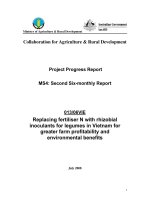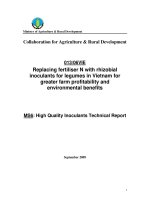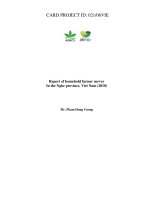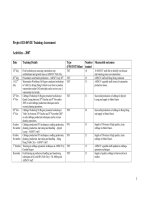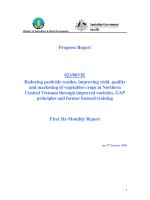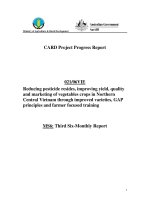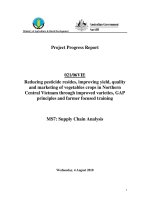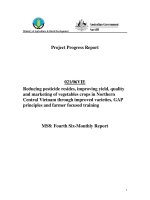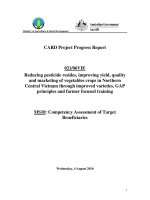Báo cáo khoa học nông nghiệp " Establish nurseries and training to effectively propagate high quality trees and trial plantation models of Macadamia in 3 provinces of North Vietnam, 2006-2008 " doc
Bạn đang xem bản rút gọn của tài liệu. Xem và tải ngay bản đầy đủ của tài liệu tại đây (35.18 KB, 8 trang )
1
Macadamias in Vietnam
The beginnings of a sustainable industry
Report of Macadamias CARD Project 037/VIE/05
Present at CARD Workshop, Bac Kan, April 20,2010
Project Title: Establish nurseries and training to effectively propagate high quality
trees and trial plantation models of Macadamia in 3 provinces of
North Vietnam, 2006-2008
Name of Reporter/ Authors: Project Leader: Hoang Hoe and Martin Novak
Implementing agency: Center for Environment Tourism and Development (CETD)
Vietnam in collaboration with Sub Tropical Farm Forestry
Association (SFFA) Australia
1. Project objectives
Objective 1 - Bring all the stakeholders together to work toward a sustainable high
value Macadamia industry for Vietnam.
A number of meetings and communiqués were undertaken during this period in Vietnam
and Australia with Collaborators, past and potential workshop participants including new
farmers to the project.
The relationship with Chinese and Thai colleges was strengthened by way of one visit
each by project leaders and project key partners to China and Thailand. In addition to this
an ongoing dialogue has been maintained via phone and email. Invitations to the Ba vi
Training Workshop (2008) and Buon Me Thuot Workshop (2009) have been given to
Thailand and Chinese Macadamia Industry researchers and stakeholders.
Objective 2 - Strengthen the capacity of 3 existing nurseries.
Once again additional Australian scion wood was delivered to all 3 existing nurseries
including the following varieties. 246, 344, 741, 814, 816, 842, 849, A4, A16, A38.
Training sessions were delivered at all 4 nurseries along with additional samples of
nursery equipment and demonstration DVD’s and CD’s.
2
Objective 3 - Establish a new model nursery to demonstrate Australian nursery
practice. To provide opportunity for investment and to ensure adequate supply of
stock.
The new nursery was established since 2006 and considered to be ready to scale up
production. It has already propagated over 6000 macadamia nut seedlings which have
now been potted up and housed in the new shaded area.
The sand bed propagation of nut seed from China has been very successful at Yen Thuy
with only 300 losses out of 6400 from 100 kg of nut as compared with Lang son which
has 4200 seedling trees from 100 kg and Ba vi 2400 seedling trees from 100 kg.
Potted tree growth also appears to be better that the other nurseries as a result of a better
potting mix with less soil and larger pots, based on the Australian experince.
Objective 4 - Trial at least 10 varieties of Macadamia in 3 difference provinces Ba vi,
Hoa binh and Lang son of Vietnam.
The Van Linh trial in Lang son has been mostly planted . Site 1 has close to 400 grafted
trees of all the selected varieties planted. Site 2 the smaller site is fully prepared with 178
planter holes ready for planting shortly.
At the Ba vi Trial site 2 hectares have been planted including A4, 344, 900, 246, A16,
695, 814, OC, 800, 849, A38, 741, 816, 842. The quality of the trees appear to be good,
although more fertiliser and weeding was recommended by Kim Wilson.
The Yen Thuy trial site 1,9 Ha has been planted including 13 varieties. It will require
fencing because of cattle in the area.
Objective 5 - Undertake a Study tour of South China. 10 key project participants,
including trainers and researchers.
The final reports, one from the Vietnamese team leader and an English version from the
Australian Team leader, on the successful Macadamia Study Tour Of China, which took
place in March/ April of 2006 was delivered to all participants of the Lang son Training
workshop.
Objective 6 – A Study Tour to Assess Macadamia developments in Thailand.
Project leaders and 4 project key participants to undertake the study tour in 2007.
Prof Choob, Prof. Bunvong and Prof. Monton of Kasetsart University, who are helping to
arrange a tour of Macadamia plantations in October 2007. The tour was include visits to a
number of research plantings and nurseries as well as some private commercial nurseries
and plantations.
3
The Thais have been involved with the growing of Macadamia for over 20 years and
have supplied seed to WASI last year. They have undertaken research in propagating and
growing macadamia in tropical high elevation areas which will have relevance to
highland areas in central and south Vietnam.
Objective 7 - Undertake participatory training for technicians, extension officers,
nursery staff and workers, farmers and farm workers.
Training was delivered during the Australian teams visit in February / March and August/
September in all the nurseries and trial sites in three years(2006-2008)
Ongoing informal training also continues in all of the participating nurseries especially
since staff and technicians are gaining knowledge and confidence as the project
progresses.
Objective 8 - Support the formalisation of a Macadamia industry network. Based on
the successful Australian model (AMS) and other models in Vietnam and elsewhere.
A Macca Club of Vietnam meeting was held during the Australian team leaders visit on
the 10 March 2006. The Club was founded by former Vice Prime Minister Nguyen cong
Tan, Prof. Hoang Hoe and Mr. Nguyen Huu Loc, involved 10 researchers, practicers,
businessmen, government officers and farmers who has interested to the development of
macadamias industry.
Martin Novak gave a PPT presentation on the development of the project including
challenges, especially in terms of quality of nursery production. Kim Wilson gave PPT
presentation on introduce experiences of Australian Macadamias Society (AMS)
Objective 9 - Assist and share information, experience and data with existing
Macadamia researchers in Vietnam in particular with FSI and WASI
The proceedings of four Training/ Workshops has been held by project in Lang Son 2006,
Ba Vi 2007, Hanoi 2008, Buon Me Thuot 2009, contain information for all the key
project participants including an informative presentation by FSI, WASI, others project
key participants and this has been distributed to all the Training Workshop participants
and others.
In addition two processors Thai Binh Foods, Donnafoods and others including smaller
farmers, continue to exchanging information and experience with the project team and
each other.
Objective 10 - Collect data from existing and new trial plots and nurseries and
undertake evaluation and analysis.
Now that a significant amount of data has been collected by the project team and other
participants, work has been able to start on the Nursery Tree Movement and Sales Model
XL Spread sheets and the Macadamia Capital Development & Financial Projections
4
Model XL Spread sheets. This a key part of the Milestone 3 report utilising the relevant
baseline data collected to date.
Objective 11 - Inform stakeholders and others and promote the objectives of the
project specifically and the benefits of a Macadamia industry generally.
The network of stakeholders and others has grown significantly since the start of the
project at the beginning of 2006.
All relevant government agencies and all known participants in macadamia initiatives
have been informed of the project role and activities and invited to Training Workshops.
The publicity generated by the Workshops has helped to promote macadamia generally in
Vietnam. This has raised the interest of farmers and investors resulting in the planning
and start up of a number of new macadamia plantations.
Objective 12 - Strengthen extension capacity by linking it to research and the
practitioners.
Communication has been maintained with extension and technical staff from all
participating agencies and companies involved with the macadamia industry including all
those that attended Training/ Workshop that included researchers and practitioners from
China, Thailand ,Vietnam and Australia.
The project work continues to strengthen the capacity of the technicians and extension
personnel of the principal nurseries and trial plot participants.
2. Materials and Methods
• Introduced new seed from Australia and China
• New scion wood introduced to Vietnam from Australia and China
• Nursery Equipment
• Information on propagation
• Established 3 variety trials
• Training sessions
• New nursery
• Seed and scion wood provide by the project:
Seed from Australia 440 kg of H2
Seed from China 600 kg of H2 and other
Scion wood : total 17 varieties -13 varieties from Australia: A4 A16 A38, 246 344
741 816 842 849 814 A203, A268 Daddow, and 4 Varieties from China: Que
Nhiet 1, 695 788 OC
• Nursery Equipment
New grafting tape
Grafting Planes
5
Grow bags
Wounds dressing
Potting bags
3. Results and discussion
This project has 2 principal aims, firstly to trial the most suitable macadamia varieties in
Vietnam and secondly to train nursery staff, farmers and others in related aspects of
macadamia horticulture. In addition to this the project has been attempting to bring all
existing and some potential stakeholders together in formal and onsite participatory
training sessions in order to help facilitate Vietnams macadamia industry development in
a more strategically coordinated manner.
Most project participants seem to be of the view that the industry will be viable and
sustainable within Vietnams agricultural sector. In fact it appears to have the potential to
replace or enhance some crops that are struggling at present.
The project leadership is working closely with macadamia initiatives that existed prior or
outside of the projects principal scope, such as the work done by FSI and WASI.
The Australian team has been in a position to introduce the participants to key aspects of
Australia practice and research. This is very valuable if Vietnam is to have a good
foundation upon which it can build this new industry. Complimenting this is additional
information being sourced from other countries, especially China, but also from South
Africa and Thailand.
The skills and knowledge base of Vietnams macadamia industry stakeholders has grown
significantly since the first assessments were made by the project leaders in 2004 and
2005. Because of the interest, enthusiasm and hard work of the project participants, the
fledgling industries capacity to develop into an internationally competitive industry is
well established.
Since the commencement of this project a number of new nurseries have been established
and others have been expanded. The quality and production times of macadamia grafted
trees have improved. In addition to this a number of macadamia trials have been
established throughout the most suitable agricultural areas of Vietnam, including 3
variety trials supported by the project. The quality and growth rates of these plantings
indicate a high level of competency amongst the staff of the enterprises involved.
The project has conducted training workshops, extension and field training for all project
participants. The latest formal training workshop was held in Dak Lak province in
October 2009, at which over 100 participants took part. (Dak Lak Macadamia Training
Workshop Proceedings and Presentations are attached as separate PDF documents).
These workshops have been successful in raising participants knowledge base, in specific
aspects of the macadamia industry. Most of the project participants have prior capacity in
fields of agricultural and horticulture and have progressively built upon this capacity
throughout the life of the project.
6
The role of providing extension and demonstration, other than that of the project, has
fallen mostly to WASI, FSI and Long Phuong Company. A macadamia association if
formed could also provide or facilitate, an extension and demonstration role.
The vice-minister of MARD Mr Bui Ba Bong has been approached regarding the
importance of support of extension and demonstration for the macadamia industry. He
has indicated that MARD should and would provide support, The National Center for
Extension of Agriculture and Fishery, MARD, was held National Workshop on
Macadamias in Ba Vi last August 2008, 100 participants from 8 provinces of North
Vietnam has been attending to this Workshop.
The issue of the need for an entity to provide leadership for the future development of the
industry is still something that needs to be addressed. It was hoped that with the
formation of the Macca Club, by the former Vice Prime Minister Mr Tan, it would fulfil
this role.
Prior to this there was some uncertainty as to whom the club represented and what its role
should be. The project team has recommended that the Club evolve beyond its previous
role and become a lot more inclusive and perhaps change from a club to an association or
society, something along the lines for the Australian Macadamia Society.
At present VIFA has become the umbrella organization through which a Macadamia
society or association could evolve,. Once this new group is formalised and become
active, it could be the ideal vehicle to perform a leadership and promotional role. This
concept was offered up at the Dak Lak workshop to participants and was greeted with
enthusiasm. Potential members were noted. Prof. Hoang Hoe is making some effort
towards facilitating this development. This is leading to the possible formation of a
Macadamia Association in Dak Lak.( belong the umbrella of the Union of Science &
Technology Associations of Dak Lak province)
Details of the formation of a Macadamia association in Dak Lak involving Central
Highland Agricultural Science Institute(WASI), Long Phuong Co. and farmers, are yet to
be confirmed. The Peoples Committee of Dak Lak was accepted to this process of
formation of this Association. Since the focus of activity with regard to macadamia
industry development has shifted to the Central Highlands, it makes sense to establish
some type of coordinating entity that will guide development in the region.
The region and its farmers have proved themselves to be very capable in developing new
and successful horticultural industries, such as coffee, cashews and rubber. The
knowledge and skills involved in these industries will stand them in good stead if they
become involved in the developing macadamia industry. Based on the work of WASI,
FSI and Long Phuong Co. the regions climate and soils also lend themselves to the
growing of macadamia.
Based on these considerations and the initiatives already taken, the capacity of the central
highlands region to become a principal macadamia growing region looks promising.
7
There is also demonstrated potential in north west Vietnam and in provinces such as Hoa
Binh, Son la, Dien bien province
4. Conclusion and Suggestion
Challenges
- Problem with flower fungi probably Botrytis at Lang son and Ba vi. The same
problem was noted in China. High humidity and light rain for prolonged
periods during flowering stage.
- Premature nut drop probably because of dry conditions during the nut
development stage
- Grafting technique can be further improved as can cloning and budding.
- Needs to be better identification of Varieties at all nurseries.
- Need for form pruning and utilizing the wood for Scion.
- Potting mix is mostly soil in all nurseries as it is in China this can lead to slow
growth poor root development and root fungus
- Grow bags are only small and very thin prone to tear.
- There is a problem with fast growth and trees falling over.
- Communication needs to improve between all participants leading to better
transfer of information.
The ideal future
- Variety trials to provide data
- Existing nurseries producing good trees
- New nursery used for demonstration
- Data collection standardised and shared
- Promotion of Macadamia progress to farmers
- Macca Club becomes Macca association
- Macadamia strategy plan in place
- Expand involvement of all stakeholders
- Farmers to use good extension
- Policy of Investment from Government & Business
8
8. References
1. MS Report 3, 5, 8, 10 of Project 037/VIE/05
2. Information Training and support notes
- Choosing varieties and support notes*
- Row and trees spacing options*
- Planting Procedures*
- Managing Young Trees*
- Nursery Manual*
- Macadamia Financial Returns for Vietnam
- Nursery Financial Returns
- Strategy for Macadamia Nurseries
- Macadamia China Study Tour Report
* Notes based on Australian Macadamia Manual
3. Information
• CD Presentations - Photos and Papers
- Grafting Macadamia in Australia – 2006
- Macadamia China Study Tour – 2006
- Australian Macadamia Nurseries – 2006
- Macadamias in Vietnam – 2004-6
- Macadamia New Nursery - Yen Thuy
- Macadamia Workshop Proceedings Lang Son 2006
- Macadamia Workshop Proceedings Ba vi 2007
- Macadamia Workshop Proceedings Hanoi 2008
- Macadamia Workshop Proceedings DakLak 2009
4. Video - DVDs
- Macadamia in Vietnam 2004
- Macadamia in Vietnam 2005
- Macadamia China Study tour 2006
- Macadamia in Vietnam – March/April 2006
- Grafting Macadamias in Australia March 2006
- Macadamia Grafting in Vietnam & Australia
- Macadamias in Australia – AMS Video
- Macadamia in Thailand - October 2007
- Macadamia Training Workshop in Hanoi -October 2008
- Macadamia De-husking in Australia
- Macadamia Training workshop Video Daklak August 2009 (DVD)
All the above information is available from
CENTER FOR ENVIRONMENT, TOURISM AND DEVELOPMENT
MACADAMIA PROJECT 037/ VIE/ 05
Address: 114 Hoang Quoc Viet str, Cau Giay, Hanoi
Tel/ Fax: 844-7560233; Email:
